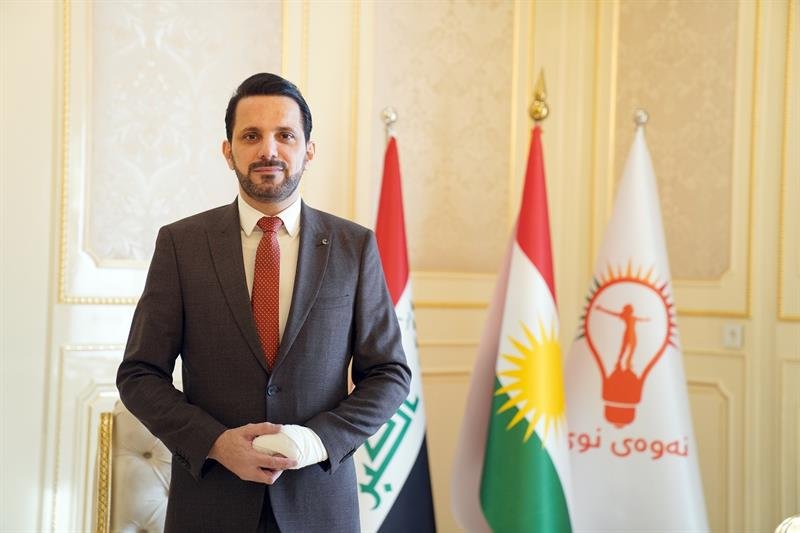Shaswar Abdulwahid Faces Trial in Case That Could Reshape Kurdish Politics

Shaswar Abdulwahid, leader of the New Generation Movement and the largest opposition group by vote share in the Kurdistan Region, is set to be put on trial in a case that could determine both his personal freedom and the political future of his movement.
Context: Abdulwahid has been under arrest for nearly a week by court order, based on a complaint filed by Shadi Nawzad, a former New Generation MP in the Kurdistan Parliament who has since joined the PUK. He faces a six-month prison sentence that was previously handed down in his absence on charges of “making threats” against Nawzad. Having appealed the ruling, the case has now moved to the appeals stage.
Analysis: the judge on Thursday will consider three main possibilities: first, upholding the sentence—the judge could confirm the earlier ruling and enforce the six-month prison term, meaning Abdulwahid would remain in prison until serving the full sentence. Second, release on bail—the judge could decide to reopen the case and set a new court date, granting Abdulwahid release on bail until the next session. Third, continued detention until retrial—similar to the second scenario, the judge could set a new trial date but order that Abdulwahid remain in custody until then.
The complaint filed by Shadi Nawzad represents only one case in a series of legal troubles Abdulwahid has faced in recent years. At present, at least three other cases remain active, including a case over tearing down a campaign banner of a Kurdistan Democratic Party (KDP) candidate near the village of Almani in Sulaimani, a case dating back to the pandemic accusing Abdulwahid of defying quarantine rules, and a lawsuit filed by another KDP candidate over a statement Abdulwahid made saying, “Anyone with dignity should not become a candidate of the authorities.”
A source within the New Generation Movement indicates that three additional cases are being prepared—two related to encouraging protesters in Kalar and Halabja, and another filed by the Sulaimani Directorate of Public Health.
Beyond the legal cases, Abdulwahid, who also owns the Nalia Group of Companies including the popular NRT TV—the backbone of New Generation’s ability to garner votes—faces mounting financial pressure.
According to an official document from the Sulaimani Enforcement Directorate, Nalia owes 91,760,660,350 IQD to a Sulaimani Bank, which falls under the KRG’s Ministry of Finance. This loan was taken to finance the Chaviland project but remains unpaid. Consequently, the bank has pursued legal action, requesting the seizure of all company properties and assets. Documents show that enforcement orders were issued in September 2024 and February 2025.
A New Generation source confirmed that “several of Nalia’s properties have already been seized and could be sold to settle the debt.”
Shaswar Abdulwahid, a businessman-turned-politician, built New Generation into a significant opposition force by offering sharp criticism of the ruling parties (the KDP and PUK) and appealing to public dissatisfaction with corruption and mismanagement.
His supporters consistently describe the series of legal cases against him as “politically motivated pressure” and “an attempt to silence the opposition.” In contrast, his opponents and government circles emphasize that the cases are legal matters and insist that “everyone should be equal before the law.”
Yet the timing of the trial weakens the perception of neutrality. The case has been reactivated just months ahead of Iraq’s parliamentary elections, at a moment when the PUK is politically vulnerable. After campaigning on an anti-KDP platform in the Kurdistan elections last year, the PUK made a sharp U-turn afterward. This dramatic policy shift has weakened the PUK’s credibility and created an opening for New Generation to potentially overtake them in vote share in Sulaimani—a prospect that PUK leader Bafel Talabani desperately wants to prevent. Talabani has staked his reputation on reviving the PUK since expelling his co-leader and cousin Lahur Sheikh Jangi in 2021, making any further erosion of the party’s influence particularly damaging to his leadership.
Thus, tomorrow’s court session will not be just another routine court date for Shaswar Abdulwahid. It will be a crucial moment that could reshape the political landscape of the Kurdistan Region and determine the future of one of its main opposition movements.









